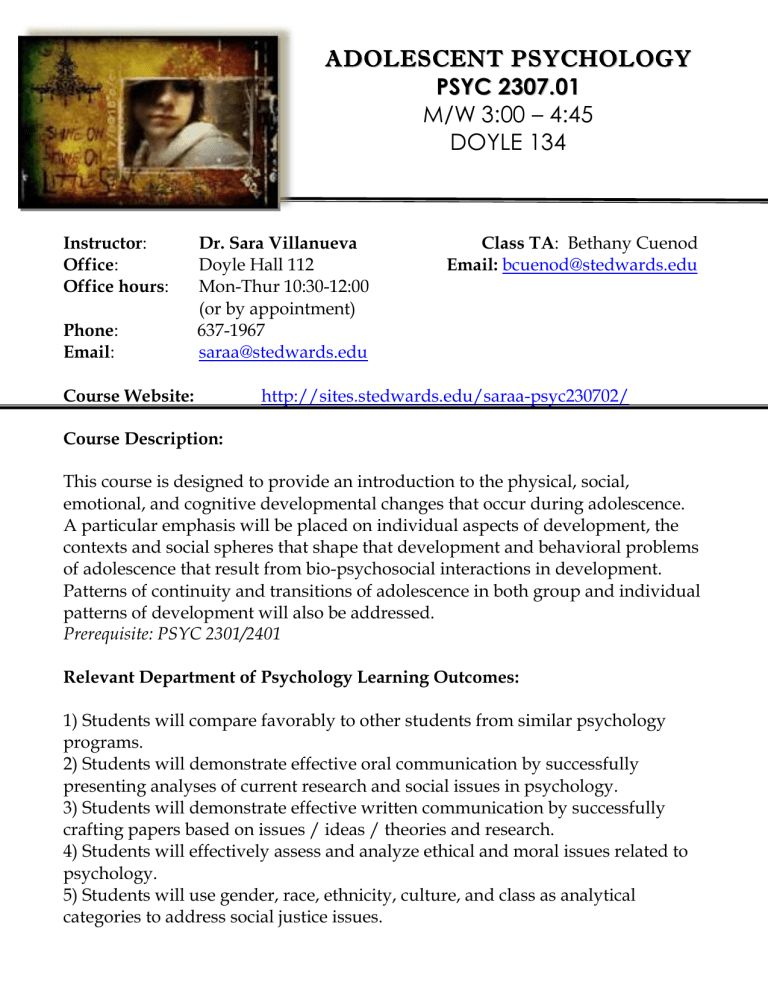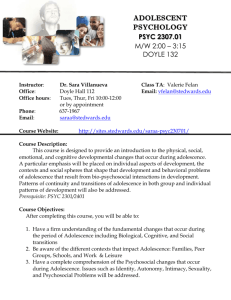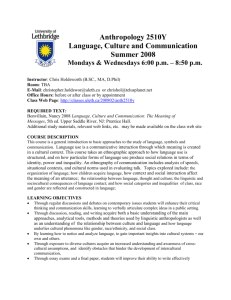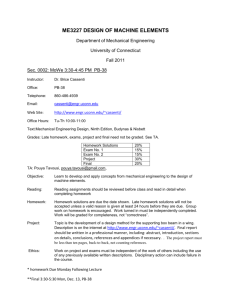child development - St. Edwards University

A D O L E S C
P
E
S Y
N
C
T
2
P
3 0
S
7
Y
.
.
0
C
DOYLE 134
1
H
M/W 3:00 – 4:45
O L O G Y
Instructor:
Office:
Dr. Sara Villanueva
Doyle Hall 112
Office hours: Mon-Thur 10:30-12:00
(or by appointment)
Class TA: Bethany Cuenod
Email: bcuenod@stedwards.edu
Phone: 637-1967
Email: saraa@stedwards.edu
Course Website: http://sites.stedwards.edu/saraa-psyc230702/
Course Description:
This course is designed to provide an introduction to the physical, social, emotional, and cognitive developmental changes that occur during adolescence.
A particular emphasis will be placed on individual aspects of development, the contexts and social spheres that shape that development and behavioral problems of adolescence that result from bio-psychosocial interactions in development.
Patterns of continuity and transitions of adolescence in both group and individual patterns of development will also be addressed.
Prerequisite: PSYC 2301/2401
Relevant Department of Psychology Learning Outcomes:
1) Students will compare favorably to other students from similar psychology programs.
2) Students will demonstrate effective oral communication by successfully presenting analyses of current research and social issues in psychology.
3) Students will demonstrate effective written communication by successfully crafting papers based on issues / ideas / theories and research.
4) Students will effectively assess and analyze ethical and moral issues related to psychology.
5) Students will use gender, race, ethnicity, culture, and class as analytical categories to address social justice issues.
Course Objectives:
After completing this course, you will be able to:
1.
Have a firm understanding of the fundamental changes that occur during the period of Adolescence including Biological, Cognitive, and Social transitions
2.
Be aware of the different contexts that impact Adolescence: Families, Peer
Groups, Schools, and Work & Leisure
3.
Have a complete comprehension of the Psychosocial changes that occur during Adolescence. Issues such as Identity, Autonomy, Intimacy, Sexuality, and Psychosocial Problems will be addressed.
4.
Through lectures, class discussions, activities, assignments, students should be able to demonstrate their ability to identify controversial, unresolved, or current issues in the field of Developmental Psychology as well as to demonstrate their ability to assess ethical issues related to this field
5.
Understand Adolescent development in the context of varying cultural backgrounds and appreciate possible group differences
Required Readings:
Most readings will be out of the course textbook (see reference below). Additional readings for the bi-weekly blogs will come from the Adolescent Behavior and Taking
Sides books.
Rye, B. J. (2009, 2 nd Ed.) Taking Sides - Clashing Views in Adolescence. New York:
McGraw-Hill Publish
Steinberg, L. (2008). Adolescence, 8th Ed. New York: McGraw-Hill Publishers.
Class Communication
Throughout the term, I will use the Course Website to post announcements, upcoming events & dates, and other important information. In addition to checking the class website regularly, please make it a habit to check your email every day. To access lecture notes after the lecture, you can use Blackboard
(http://blackboard.stedwards.edu/). You can access handouts, assignments, video clips, and the syllabus, etc., via the course website at: …………We also encourage you to use our Open Class Blog on the course website as a forum to ask questions (e.g., about the class, the material, the exam) and/or to discuss issues relevant to Adolescence and Adolescent Psychology (e.g., stories/examples in the
media). Of course, you are always welcome to contact me directly via email or by phone.
Class Attendance & Participation:
Class meetings will involve lectures, discussion, exercises, videos, and guest speakers. Questions and discussion are an important part of the course and are strongly encouraged. Note that because there are so many interesting topics to cover and our time is limited, we will not be able to go over everything in the textbook. Instead, lectures will expand upon the text by considering a few topics in more depth, and will also introduce concepts and studies not discussed in the text. Thus, it is important that you take responsibility for learning the material in the text and for coming to class prepared.
Students are expected to attend every class. Because it is assumed that you are all responsible adults who are here to get the best quality education, it is also assumed that YOU are responsible for coming to class and getting the necessary information. In the event that you do have to miss class for whatever reason (I know life happens), please make sure to have the courtesy to do the following: (1)
Notify the instructor and copy the teaching assistant PRIOR to the class that you cannot make (i.e., talk to us personally or call and leave a detailed message on voice mail) and (2) Provide official documentation of your emergency (e.g., a written medical excuse signed by a physician). The important thing is for you to communicate with me when something comes up. I cannot do anything after the fact, but I can try to work with you as much as possible before or during the issue.
Finally, PLEASE BE ON TIME AND TURN OF YOUR TECHNOLOGY--it is very
distracting to both me as well as the other students in class when people straggle in after class has begun or have a cell phone ring during class.
What does “class participation” include?
• Be fully prepared for class-that is, reading the chapter and reviewing the lecture material BEFORE the class discussion time.
• ACTIVELY participating in all online discussion sections by asking questions and putting forth ideas when questions are asked by others
• Listen attentively to others’ points of view.
• Ask questions of TAs and instructors to better understand course material.
• Share and discuss ideas in a respectful manner.
• Engaged in class activities and support other students’ learning.
• Set goals for your learning and reflect on your learning process.
• Consider the impact of what you’re learning inside and outside of class.
How will “class participation” be evaluated? Attendance in class, taking part in discussions and class activities, and interaction with peers will be considered in determining each student’s grade, according to the professional judgment of the professor. Class participation is not simply attending class. Rather, it is being a prepared, active member of the class.
Lectures & Class Discussions:
The purpose of the lectures is to amplify, explain, and expand on the materials in the textbook. Although there is some overlap between the assigned readings and the lectures, lectures are not intended to regurgitate what you’ve already read; rather, they are to introduce new and unique material that goes along with the topic covered in the chapter. Your understanding of each lecture will be best if you studied the assigned readings before you come to class. The instructor will, as much as possible, include film clips and other audiovisual materials in this course, mostly for illustration purposes. You are responsible for all the material covered in each class meeting. All of the materials can be included in the exams.
Class Notes:
Copies of the slides from class will be available AFTER we have completed a topic or chapter from the syllabus schedule on the Blackboard site for this course. I extend this courtesy so you do not have to write down every definition and concept down while you are in class and you have a full set of notes to study from. The full set of notes will not be available before the topic is covered, as some students have a tendency to disengage when they are not actively writing or asking questions. Please take additional notes and ask questions in class.
Assignment Policies:
Reading assignments for each class meeting are clearly listed in the course outline.
Readings are to be completed BEFORE the topic is to be covered in class to ensure better understand of the lecture. Students should read the assigned reading material before class and come prepared with any questions or discussion points.
Additional online readings/handouts will be announced in class.
PLEASE NOTE: Any assignments turned in late will be deducted by 10 points for each day that it is late for up to 5 days. Any assignment submitted after 5 days past the assignment due date WILL NO LONGER BE ACCEPTED - NO EXCEPTIONS.
Special Needs:
If you have a specific physical, psychiatric, or learning disability and require accommodations, please let me know early in the semester so that your learning needs may be appropriately met. You will need to provide documentation of your disability to Academic Planning and Support, located in Moody Hall 155
(448-8660).
Academic Dishonesty:
We will follow the rules regarding academic dishonesty that are outlined in the
SEU Student Handbook. Academic dishonesty in any form will NOT be tolerated and will be subject to appropriate action.
COURSE GRADES
Assignments Points
Class Attendance & Participation
Exams – 3 @ 150 pts each
Taking Sides Blogs – 4 @ 50 pts each
Reading Reaction Quizzes – 4 @ 25 pts each
Learning Goals Paper 1
Learning Goals Paper 2
Group Wiki Presentation
Total Points
Course grades will be based on the total points earned and will be assigned as follows:
100
450
200
100
25
25
100
1000
A 900-1000 B 800-899 C 700-799 D 600-69 9 F (<600)
1. Class Participation (100 points total)
As previously discussed, we will be covering a great amount of information in each class meeting. There will be class activities, guest speakers, films, etc; thus, your attendance and participation are crucial to your understanding and success in this class. Students will engage in many academic activities throughout the semester which are critical to the understanding and applications of concepts being taught in class. It is expected that you not only attend class, but it is also expected that you play an active role in your learning experience.
2. Exams (150 points each)
There will be three in-class Exams given. Exam material will be drawn from the textbook and outside readings, material covered in lectures (including class
discussions), and any film clips and/or guest speakers presented in class. Exams are NOT cumulative. Dates for the exams are on the course schedule attached.
Answers to the questions should draw on the readings as well as the material presented in class. The entire class period will be allotted for exams.
Exam Make-Up Policy
Make-up exams are strongly discouraged and will be granted only under exceptional circumstances, such as serious illness, or death in the immediate family. To be eligible for a makeup, you MUST adhere to the following two conditions: (1) Notify one of us PRIOR to the exam that you cannot make it (you can leave a detailed message on voice mail) and (2) Provide official documentation of your emergency (e.g., a written medical excuse signed by a physician). All makeup exams will be given within two days of the original exam.
IN ORDER TO BE FAIR TO ALL STUDENTS, THERE ARE NO EXCEPTIONS TO
THESE POLICIES.
3. Taking Sides Blogs (50 points each)
On the course black board site you will see a document under the assignments section that lists the topics for our blog journal assignment. You are to complete 4 blog entries worth 50 points each. All students will write blog entries that not only ask you to give a brief synopsis of the reading, but also require you to reflect on your own attitudes, experiences, and behaviors with respect to the topic you’ve read. Each blog will be posted in blackboard and will have the topic and instructions. Blog entries are worth 50 points each--to get full credit, your entry must be thoughtful (not fluffy or rushed), insightful, and well written. They are due before the start of class on the due date*. Blogs are ONLY accepted if they are posted to the private Journal Entry Blog. They WILL NOT be accepted if they are sent via email, hard copy, or even posted to the open class blog. So, please make sure you are familiar with where to post your Blog. Please note that it is ultimately your responsibility to turn entries in on time, as there will generally be no announcements or reminders. (Remember that blogs are time-stamped…) *See statement on late assignments.
4. Reading Reaction Quizzes ( 25 points each)
You will have two extra readings assigned during the semester. You are to read the assigned readings and be prepared to take a short quiz over the reading at the beginning of class.
5. Learning Goals Papers 1&2 ( 25 points each)
See separate documents listed under Assignments in Blackboard for the specific guidelines on these papers.
6. Group Wiki Presentation (100 points)
This project is a more innovative approach to the typical group research project in that they will be building a wiki to display their collective research information. Students are to select a topic and be assigned to a group of 4 or 5 students covering that topic. After choosing the topic, individuals in the group are to divide up the sub-topics to be covered and conduct the research to populate the appropriate section of the wiki. Students will have all semester to work on this group project and will have deadlines to meet along the way, which will be listed under the Assignments tab on the course website. On the due date, groups are to present their group research wiki to the class, where each individual group member will guide the class through their own section. This assignment will be explained in detail in class and a separate guidelines document as well as a rubric will be posted to the course website.
ADOLESCENT PSYCHOLOGY
Course Schedule
Below you find the tentative course schedule. Please keep in mind that this schedule is a “best-case scenario” that is subject to change. Students are responsible for keeping informed of any changes to this schedule announced in class or on the class page on Black Board.
DATES TOPIC READING ASSIGNMENTS
Mon., Aug 27 Introduction/Review of
Syllabus
Wed., Aug 29 Biological Transitions
Course Syllabus
Steinberg Chapter 1
Mon., Sept 3 LABOR DAY – NO CLASS
Wed., Sept 5 Biological Transitions *Blog 1 Due
Discuss Blog Topic 1 in Class
Mon., Sept 10 Cognitive Transitions
Wed., Sept 12 Cognitive Transitions
Steinberg Chapter 2
*Learning Goals Paper 1 Due
Mon., Sept 17 Social Transitions
Wed., Sept 19 Social Transitions
Review for Exam 1
Mon., Sept 24 EXAM 1
Wed., Sept 26 Families
Steinberg Chapter 3
Mon., Oct 1 Parent-Adolescent Conflict Steinberg Chapter 4
Wed., Oct 3 Conflict in Families
Mon., Oct 8 Parenting Villanueva Dixon, Graber, & Brooks-Gunn
Wed., Oct 10 Peer Groups
(2008). The roles of respect for parental authority and parenting practices in parentchild conflict among African American,
Latino, and European American families.
Journal of Family Psychology, 22,1-11.
Quiz
Steinberg Chapter 5
Mon., Oct 15 Peer Groups
Steinberg Chapter 4
*Blog 2 Due
Wed., Oct 17 Schools
Mon., Oct 22 School Context
Steinberg Chapter 6
Read: Shortchanging Girls, Shortchanging
America at: http://www.aauw.org/learn/research/uploa d/SGSA-2.pdf
Quiz
Read: The War Against Boys at: http://www.theatlantic.com/magazine/archi ve/2000/05/the-war-against-boys/4659/
Quiz
Steinberg Chapter 7 Wed., Oct 24 Work, Leisure, & Mass
Media
Mon., Oct 29 Work, Leisure, & Mass
Media
Review for Exam 2
Wed., Oct 31 EXAM 2 **Come dressed in a costume and you’ll get 3 points EXTRA CREDIT!
Mon., Nov 5
Wed., Nov 7
Autonomy
Intimacy
Mon., Nov 12 Intimacy
Wed., Nov 14 Sexuality
Mon., Nov 19 Sexuality
Steinberg Chapter 9
Steinberg Chapter 10
Steinberg Chapter 11
Abigail A., H., Amy H., H., Mitchell J., P., &
Carolyn Tucker, H. (2012). Beyond Age at
First Sex: Patterns of Emerging Sexual
Behavior in Adolescence and Young
Adulthood. Journal Of Adolescent Health, 50456
- 463.
Quiz
*Blog 3 Due
Nov 21-24 Thanksgiving Holidays!
Mon., Nov 26 Psychosocial Problems
Wed., Nov 28 Group Wiki Presentations
Mon., Dec 3 Group Wiki Presentations
Steinberg Chapter 13
*Blog 4 Due
Wed., Dec 5 Group Wiki Presentations
Thur, Dec 13 FINAL EXAM
3:30 – 5:45pm
Same Classroom
*Learning Goals Paper 2 Due







